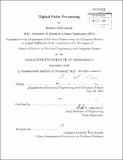Digital pulse processing
Author(s)
McCormick, Martin (Martin Steven)
DownloadFull printable version (14.58Mb)
Other Contributors
Massachusetts Institute of Technology. Department of Electrical Engineering and Computer Science.
Advisor
Alan V. Oppenheim.
Terms of use
Metadata
Show full item recordAbstract
This thesis develops an exact approach for processing pulse signals from an integrate-and-fire system directly in the time-domain. Processing is deterministic and built from simple asynchronous finite-state machines that can perform general piecewise-linear operations. The pulses can then be converted back into an analog or fixed-point digital representation through a filter-based reconstruction. Integrate-and-fire is shown to be equivalent to the first-order sigma-delta modulation used in oversampled noise-shaping converters. The encoder circuits are well known and have simple construction using both current and next-generation technologies. Processing in the pulse-domain provides many benefits including: lower area and power consumption, error tolerance, signal serialization and simple conversion for mixed-signal applications. To study these systems, discrete-event simulation software and an FPGA hardware platform are developed. Many applications of pulse-processing are explored including filtering and signal processing, solving differential equations, optimization, the minsum / Viterbi algorithm, and the decoding of low-density parity-check codes (LDPC). These applications often match the performance of ideal continuous-time analog systems but only require simple digital hardware. Keywords: time-encoding, spike processing, neuromorphic engineering, bit-stream, delta-sigma, sigma-delta converters, binary-valued continuous-time, relaxation-oscillators.
Description
Thesis (S.M.)--Massachusetts Institute of Technology, Dept. of Electrical Engineering and Computer Science, 2012. Cataloged from PDF version of thesis. Includes bibliographical references (p. 71-74).
Date issued
2012Department
Massachusetts Institute of Technology. Department of Electrical Engineering and Computer SciencePublisher
Massachusetts Institute of Technology
Keywords
Electrical Engineering and Computer Science.